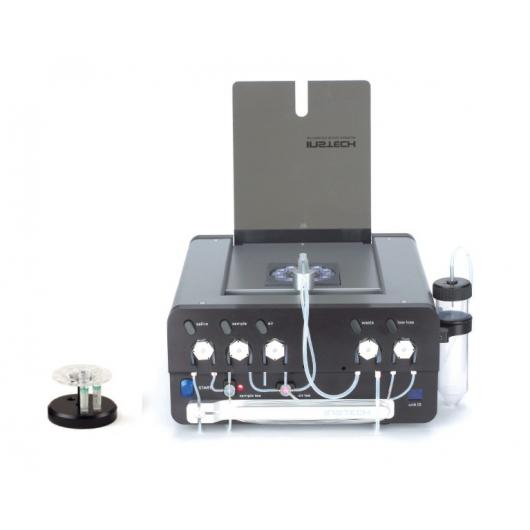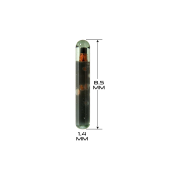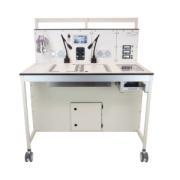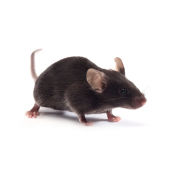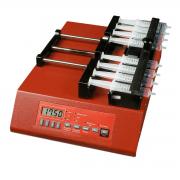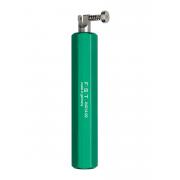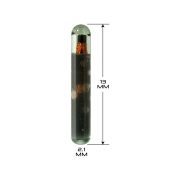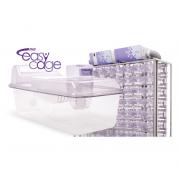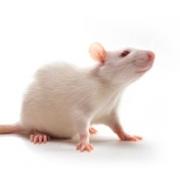
Automated Blood Sampler - Instech
Instech's ABS2™ automates the collection of blood samples from laboratory animals including mice, rats and large animals. By eliminating labor-intensive manual withdrawals it can substantially increase the throughput of pharmacokinetics research groups. It can also reduce the stress on animals caused by handling and venipuncture.
The sampler withdraws blood from a tethered freely-moving animal according to your programmed schedule, stores the samples in an integrated refrigerated fraction collector, and replaces the withdrawn volumes with IV fluid. You control and monitor sampling schedules, volumes and withdrawal rates for up to twelve animals from a central computer.
Unique advantages of the Instech blood sampling system include:
- Undiluted samples, verified by in-line sensors
- A short collection path, to minimize mixing and collection times
- Less than 5 µL of blood wasted per sample, to minimize hemodilution
- The flexibility to work with a range of species, from mice and rats to large animals
The ABS2, Instech's second-generation autosampler, builds on the proven foundation of a series of precision peristaltic pumps to move blood and IV fluids directly to their destinations. The fraction collector has been redesigned from the ground up for additional features and high reliability.
The ABS2 not only works with refrigerated vials (such as the Greiner MiniCollect® tubes), but also can deposit 10-25µL microsamples directly onto dried blood spot paper.
Instech has a version of the ABS2 that is optimized for use in PET imaging studies.
|
Sample collection options |
Greiner bio-one MiniCollect® tubes, 1.5ml Eppendorf-style centrifuge tubes, Instech dried blood spot (DBS) disks featuring Whatman FTA® DMPK paper |
|
Fraction collector type |
Rotary, 10 position; additional samples can be collected once initial samples are removed |
|
Sample storage temperature |
4-6 C, displayed on control screen in real-time (room temperature in DBS mode) |
|
Maximum number of sampling time points |
20 |
|
Sample splitting |
Samples may be split into 1, 2 or 3 dried blood spots (maximum of 60 spots) |
|
Maximum duration of sampling session |
Unlimited |
|
Collection modes |
Low Loss, No Low Loss, DBS Low Loss, DBS No Low Loss, Large Animal, Bile Collection |
|
Auto-retry routine |
Skips to next sample if user settable number of retries fail to pull in blood |
|
KVO feature for catheter patency |
Adjustable from 0-999 μL/hr; 5 μL per pulse |
|
Push-before-pull volume for catheter patency |
Adjustable from 5-50μL |
|
Time to take one sample |
Varies based on catheter and tubing volume and parameter settings (typically 3-5 min) |
|
Sample volume |
Adjustable for each time point |
|
Minimum sample volume |
10μL |
|
Maximum sample volume |
1ml (MiniCollect), 1.5ml (Eppendorfs), 25μL (DBS) |
|
Max # of 100μL samples from a rat |
33 |
|
Max # of 15μL samples from a mouse |
18 |
|
Sample dilution |
None |
|
Recommended IV fluid |
Normal saline with 5-10 units heparin per ml |
|
Volume of blood withdrawn per sample |
Sample volume plus typically 40-80μL; all but sample volume plus 2-4μL returned to animal; sampled blood volume replaced with IV fluid |
|
Tee blood sensors |
Electrical impedance technology |
|
Computer system requirements |
PC or laptop with Windows 7, >2Gb RAM, USB port |
|
Maximum samplers per computer |
12 |
|
Communication method |
USB via RS-232 converter |
|
Communication cable length |
6ft (1.8m) standard; other lengths may be ordered |
|
Power supply |
12VDC, 5A; 100-240 VAC input, 47-63 Hz |
|
Power consumption |
Less than 50W per unit, excluding computer; UPS recommended |
|
Weight |
5 kg (11lbs) |
|
Dimensions |
(WxDxH) 20 x 25 x 13 cm (8 x 10 x 5 in) |
Instech provides direct sales, installation, training and technical support in the U.S. and Europe. The Instech ABS is supported by a network of authorized distributors in countries where Instech does not have direct sales support.
Please contact us for additional information or a quotation.
- Gantert, L. et al, Merck & Co., Inc., "Automated Arterial Blood Sampling in Rhesus Monkey PET Imaging Studies," presentation at Infusion Technology Organisation conference, Cologne Germany, 7 September 2015.
- Kenny J. et al, Merck & Co., Inc., "Utilization of Mouse Automated Blood Sampling (ABS) for Serial Plasma Pharmacokinetic (PK) Studies," poster presentation at AALAS TriBranch Symposium, Atlantic City, 9 June 2015.
- Galgosi A., Merck & Co., "Automated Blood Sampling in Rats; Practical Considerations," presentation at Harlan DMPK Seminar, Frankfurt Germany, 8 June 2011.
- Uyeda C., Fide S. et al, Amgen Inc., "Evaluation of Automated Blood Sampling for Low Volume Serial Sampling and Dried Blood Spot Pharmacokinetic Applications in Mouse and Rat," poster P218 at AALAS conference, San Diego CA, 4 October 2011.
- Uyeda C., Pham R., Fide S., Henne K,. Xu G., Soto M., James C., Wong P, Amgen Inc., "Application of automated dried blood spot sampling and LC–MS/MS for pharmacokinetic studies of AMG 517 in rats," Bioanalysis (2011) 3(20), pages 2349–2356.

